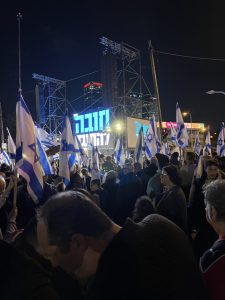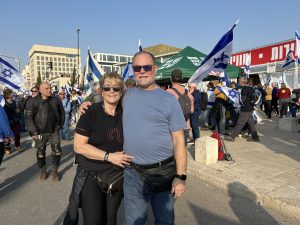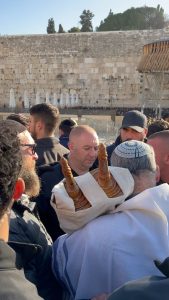Yedid Nefesh at the beginning of Kabbalat Shabbat, we are looking to find a way to bring us closer to God, setting the mood for welcoming Shabbat. Asaph Neve Shalom shares our love poem.
Shabbat Shalom
Yedid Nefesh at the beginning of Kabbalat Shabbat, we are looking to find a way to bring us closer to God, setting the mood for welcoming Shabbat. Asaph Neve Shalom shares our love poem.
Shabbat Shalom
Within this parsha lies an extraordinary verse. As you will recall, Miriam contracted leprosy and was consigned outside the camp until she recovered. This comes on the heels of what Moses could see as a betrayal of him by Miriam, challenging his authority as the leader of the people. However, putting aside personal hurt, Moses prays to God for her recovery, saying, “El nah refanah lah. Please, God, heal her.” Moses teaches us to embrace our humanity and our need for human relationships, not mired in anger, but to replace retribution with reconciliation and to do the right thing.
In the words of the modern prophet Ted Lasso in response to Nate’s return as the prodigal son, “I hope that either all of us, or none of us, are judged by the actions of our weakest moments, but rather, by the strength we show when and if we are ever given a second chance.”
May their words serve as lessons for us to be better, more deeply human, and connected.
As we celebrate receiving Torah on Shavuot, Redemption Song sung by Stephen Marley helps us prepare for this Shabbat with the hope of unity and peace.
Shabbat Shalom
Koolulam is a social-musical initiative aimed at strengthening the fabric of society. The project centers around mass singing events in which large groups of non-professionals come together to form a collaborative musical creation. Koolulam brings together people from all walks of life to do one thing: stop everything for a few hours and just sing – together.
Shabbat Shalom
It seems an unavoidable conclusion to reach- we are okay with slaughter by people using guns; it is the price we pay for our rights as we see them.
If this sentiment makes you cringe, there is only one thing to do: vote out of office for anyone who does not support responsible gun legislation; and do not vote for anyone unwilling to pledge support of responsible gun legislation. This litmus test is for local, state, and national figures as this issue transcends these boundaries. Then, of course, we can continue to argue over politics or other policy issues. Still, this binary choice is what we need to make any meaningful changes.
Murderers use assault weapons to mow down masses at a time with regularity; Others use handguns to slay individuals daily. This state of affairs cannot stand. Yet, lamenting the loss is an empty gesture if that is all we do. Our commitment to creating a safer society must confront and coexist with the issues of personal freedoms. Only our vote will make change possible.
D’ror Yikra shared by Rabbi Cantor Deborah Sacks Mintz, is a song/prayer that God will redeem his people, they will prosper and enjoy Shabbat.
Shabbat Shalom
We Rise!
Sung by Batya Levine and members of Hadar, we welcome Shabbat in song. As we pray for the Peace of Jerusalem, we know there is much work to be done.
Let us Rise together-
Shabbat Shalom
Profoundly important words capture what so many of us felt on our recent trip to Israel.
Thank you, rabbi, for sharing this complexity with such clarity.
In these particularly turbulent times, this pensive song from the incomparable Rabbi Debra Sacks Mintz is a soulful prayer to help us enter Shabbat.
May peace and wholeness come to all.
Shabbat Shalom
Love (with)… all your perfect imperfections
John Legend’s beautiful song All of me, inspired by his love for his wife, Chrissy, moved and inspired many of us with the romance. But what happens when reality falls so far short of the romantic vision, pushing the boundaries of acceptable, even tolerable? Unfortunately, divorce is often the result.
I am struggling with my relationship with Israel. The aspirations of our ancient homeland land and our history drew me to the miracle that was and, in many ways, continues to be this place. But the state is pressing on issues such as racism, tolerance for pluralism, and checks and balances in government. I was suckled in a mythic Israel but have learned to ween myself, given the practicalities of a nation-state that cannot live solely by the hopes and dreams of the Jewish people. However, as Ben Gurion understood, to be a nation like other nations. It was a pragmatic understanding of survival in the harsh real world. Today, the ideals of a homeland that is both Jewish and a democracy are threatened by raw political power and expediency.
We had come to accept Jewish and Democracy in tension. But, for the first time, we face the existential crisis of threatening both. The fractious rough and tumble nature of Israeli politics and the need to form a governing coalition in Knesset has brought us to a new place.
Over time, we developed complacency in our attitudes. Israel, as a Jewish Democratic state, was always considered a given. Laws and policies often were merely annoyances and opportunities for workarounds. “Religious” marriage meant a weekend in Cyprus. The orthodox church that has become the Kotel was not an issue for the secular. Israelis have enjoyed unprecedented prosperity and unrivaled military strength, making this a safe and secure place for most. Palestinian rights, west bank settlements, and civil rights were not on the radar screen of most and were relegated to the margins.
Then came Bibi 3.0. The assault on cherished rights, once considered unassailable, has awoken many from slumber. The protests in the streets by hundreds of thousands are sending a strong message that this is unacceptable. “Guns and butter” at any cost are not enough. The extensive unbridled settlement program is intolerable, and the Israeli terrorist response to terrorism is rightly called a pogrom. To use a familiar Jewish word, it is a Shanda.
 I struggle to love the country as I continue to love the land that held a people charged to be a light unto the nations. This is my heritage. Last week during my trip to Israel with the CCAR, I was proud to be at two demonstrations in Jerusalem and Tel Aviv. I was deeply moved to see the sea of Israeli flags and patriotism on display. However, I was disgusted and deeply aggrieved to be spat on when attempting to bring our Torah for Rosh Chodesh and assaulted by yeshiva bochers as trying to stop my expression of Judaism in the Kotel space.
I struggle to love the country as I continue to love the land that held a people charged to be a light unto the nations. This is my heritage. Last week during my trip to Israel with the CCAR, I was proud to be at two demonstrations in Jerusalem and Tel Aviv. I was deeply moved to see the sea of Israeli flags and patriotism on display. However, I was disgusted and deeply aggrieved to be spat on when attempting to bring our Torah for Rosh Chodesh and assaulted by yeshiva bochers as trying to stop my expression of Judaism in the Kotel space.
I cannot turn my back on this precocious and precarious experiment. But I am distraught. I support those who do the work, including the Israeli Religious Action Center and the brave Women of the Wall. I also proudly support NGOs who envision a place where people can live in a shared society, including the Yad b’Yad schools and the New Israel Fund, on whose regional board I serve. I am actively considering dual citizenship, not to lessen my devotion to the United States, but to achieve a voice in shaping the destiny of Israel as only a voting citizen can do. I urge everyone to evaluate where they stand and what they want to do at this critical juncture.
No one can sit on the sidelines any longer.